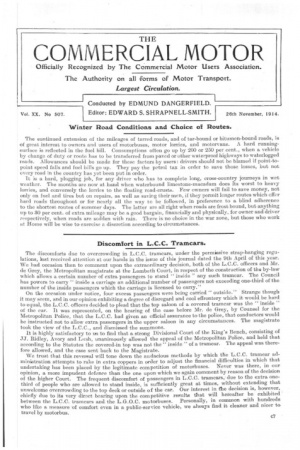COMMERCIAL MOTOR
Page 1

If you've noticed an error in this article please click here to report it so we can fix it.
Officially Recognized by The Commercial Motor Users Association.
The Authority on all forms of Motor Transport. Largest Circulation.
Conducted by EDMUND DANGERFIELD.
Editor: EDWARD S. SHRAPNELL-SMITH.
Winter Road Conditions and Choice of Routes.
The continued extension of the mileages of tarred roads, and of tar-bound or bitumen-bound roads, is of great interest to owners and users of motorbuses, motor lorries, and motorvans. A hard runningsurface is reflected in the fuel bill. Consumptions often go up by 200 or 250 per cent., when a vehicle by change of duty or route has to be transferred from paved or other waterproof highways to waterlogged reads. Allowances should be made for these factors by users : drivers should not be blamed if point-topoint speed falls and fuel bills go up. They pay the petrol tax in order to save those losses, but not every road in the country has yet been put in order.
It is a hard, plugging job, for any driver who has to complete long, cross-country journeys in wet weather. The months are now at hand when waterbound limestone-macadam does its worst to heavy lorries, and conversely the lorries to the floating road-crusts. Few owners will fail to save money, not only on fuel and tires but on repairs, as well as saving their men, if they permit longer routes which offer hard roads throughout or for nearly all the way to be followed, in preference to a blind adherence to the shortest routes of summer days. The latter are all right when roads are frost bound, but anything up to 30 per cent, of extra mileage may be a good bargain, financially and physically, for owner and driver respectively, when roads are sodden with rain. There is no choice in the war zone, but those who work at Home will be wise to exercise a discretion according to circumstances.
Discomfort in L.C.C. Tramcars.
The discomforts due to overcrowding in L.C.C. tramcars, under the permissive strap-hanging regulations, last received attention at our hands in the issue of this journal dated the 9th April of this year. We had occasion then to comment upon the extraordinary decision, both of the L.C.C. officers and Mr. de Grey, the Metropolitan magistrate at the Lambeth Court, in respect of the construction of the by-law which allows a certain number of extra passengers to stand " inside " any such tramcar. The Council has powers to carry " inside a carriage an additional number of passengers not exceeding one-third of the number of the inside passengers which the carriage is licensed to carry." On the occasion under notice, four excess passengers were being carried "outside." Strange though it may seem, and in our opinion exhibiting a degree of disregard and cool effrontery which it would be hard to equal, the L.C.C. officers decided to plead that the top saloon of a covered tramcar was the " inside " of the car. It was represented, on the hearing of the case before Mr. de Grey, by Counsel for the Metropolitan Police, that the L.C.C. had given an official assurance to the police, that conductors would be instructed not to allow extra passengers in the upper saloon in any circumstances. The magistrate took the view of the L.C.C., and dismissed the summons. It is highly satisfactory to us to find that a strong Divisional Court of the King's Bench, consisting of JJ. Ridley, Avory and Dish, unanimously allowed the appeal of the Metropolitan Police, and held that according to the Statutes the covered-in top was not the" inside "of a tramcar. The appeal was therefore allowed, and the cage sent back to the Magistrate. We trust that this reversal will tone down the audacious methods by which the L.C.C. tramcar administration attempts to rake in extra coppers in order to adjust the financial difficulties in which that undertaking has been placed by the legitimate competition of motorbuses. Never was there, in our opinion, a more impudent defence than the one upon which we again comment by reason of the decision of the higher Court. The frequent discomfort of passengers in L.C.C. tramcars,. due to the extra onethird of people who are aliowed to stand inside, is sufficiently great at times, without extending that unwelcome overcrowding to the top deck or outside of the car. Our interest in the decision is, however, chiefly due to its very direct • bearing upon the competitive results that will hereafter be exhibited between the L.C.C. tramcars and the L.G.O.C. motorbuses. Personally, in common with hundreds who like a measure of comfort even in a public-service vehicle, we always find it cleaner and nicer to travel by motorbus.


















